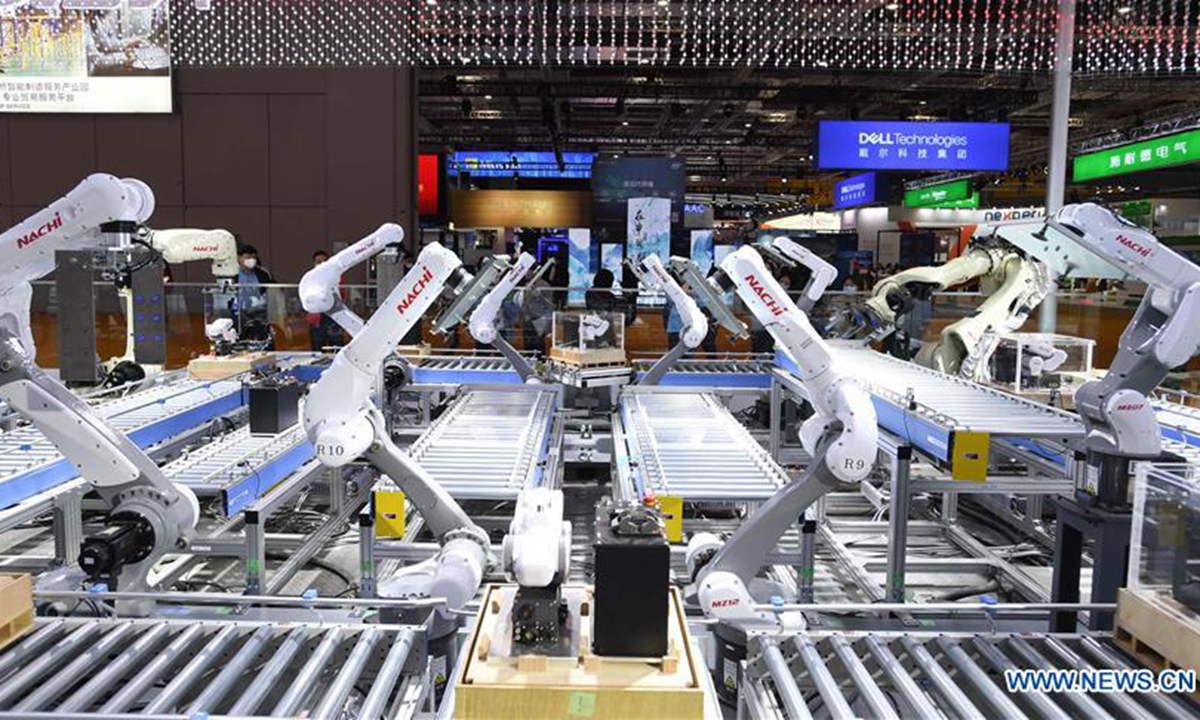Foreign-invested businesses grow fast in China in post-COVID era
Consumption potential, risk-control ability ensures growth

Photo taken on Nov. 5, 2020 shows the industrial robots of Nachi company from Japan at the Equipment exhibition area during the third China International Import Expo (CIIE) in Shanghai, east China. (Xinhua/Li Renzi)
Foreign companies that have a footprint in China have published their quarterly financial results recently, and most of their businesses displayed growth.
The brisk performance of foreign companies comes in tandem with the steady recovery of the Chinese economy, with some reporting revenue growth higher than China's consumption expansion, underscoring the vital importance of the Chinese market to expanding their revenue in the post-COVID-19 era, analysts said.
"China is on track to overtake the US to become the world's largest economy in the next 10-15 years. If foreign firms aim to maintain their leading position in the world, the priority is to cement their edge in the Chinese market," said Tian Yun, former vice director of the Beijing Economic Operation Association. "After all, who could afford to lose this market that will be home to 800 million middle-income consumers by 2035?"
For instance, Apple on Tuesday reported record revenue of $81.4 billion in the June quarter, of which $14.8 billion in sales came from the Chinese market, accounting for 18.1 percent.
Revenue generated from China increased by 58.2 percent from 2020, which represented the biggest annual growth of all markets, according to Apple's financial results.
Comparable store sales of Starbucks in China increased 19 percent in the third quarter of fiscal year 2021, driven by a 30-percent increase in transactions, read the financial report.
"We have a huge runway for growth in China, and we are only in the early chapters of our China growth story.
"Our rapidly growing national footprint, market leading digital ecosystem and customer engagement, robust innovation pipeline, and the strength of the Starbucks brand are all unmatched in the market," Belinda Wong, chairman and CEO of Starbucks China, told the Global Times on Wednesday.
Foreign companies' growth showed the robust consumption market of China, which analysts attributed to China's recovery from the COVID-19 pandemic and the digital development that empowers the macroeconomy, which is also driving the world economic recovery by supplying global industry chains.
"China's strong economic recovery during the post-pandemic era has provided tangible benefits the businesses of a large number of multinational companies in China, which have become models in their global markets," Song Qinghui, an economist, told the Global Times on Wednesday.
Tesla generated $5.9 billion in China in the first half of the year, which accounted for 26.4 percent of its total revenue, up from 19.1 percent in 2020. Meanwhile, revenue from China rose 156.6 percent on a yearly basis, far more than the 85.9-percent annual growth in Tesla's global revenue, showed Tesla's financial results released on Monday.
"With China's focus on stabilizing employment, the number of employed people is increasing, which means the basis for consumption is burgeoning," Hu Qimu, chief research fellow at the Sinosteel Economic Research Institute and a macroeconomist, told the Global Times on Wednesday.
China's retail sales increased 23 percent year-on-year in the first half of 2021, totaling 21.2 trillion yuan ($3.28 trillion), having contributed 61.7 percent to overall economic growth, according to the National Bureau of Statistics.
Food and beverage revenue reached 2.17 trillion yuan, accounting for nearly one-tenth of total consumption.
"China saw continued momentum across categories, driven by both volume and improved mix with Trademark Coca-Cola. We outpaced the overall macroeconomic recovery and by strong performance in away-from-home channels and business-to-consumer e-commerce," said James Quincey, chairman and chief executive officer of Coca-Cola Co on an earnings call on July 21.
As a result, the volume in the Chinese market of Coca-Cola grew ahead of 2019 levels, the company said in its latest financial report.
"China's stable and complete supply chain also guaranteed those foreign companies' steady production, even at the height of pandemic," Tian said, noting that as more foreign firms form a deep understanding of the value and function of China in the global supply chain, they are likely to move their production bases as well as research centers to China in the long term.
Bayer increased its investment in China by more than 400 million yuan, even in the face of the challenges of 2020.
"Bayer is proud of our deep roots in China for almost 140 years. Now, as the 14th Five-Year Plan (2021-25) is underway, we believe this market holds even greater opportunities. We will continue to cultivate the market," Ulrich Stefer, chief financial officer of Bayer Group Greater China, told the Global Times on Wednesday.
Analysts also said that the coronavirus crisis let many foreign-invested companies witness the risk-control abilities of the Chinese market.
"I figure many overseas companies will carry out their plans for Chinese market in advance and make China their most important market, particularly when overseas markets face coronavirus-induced uncertainties," Hu said.

